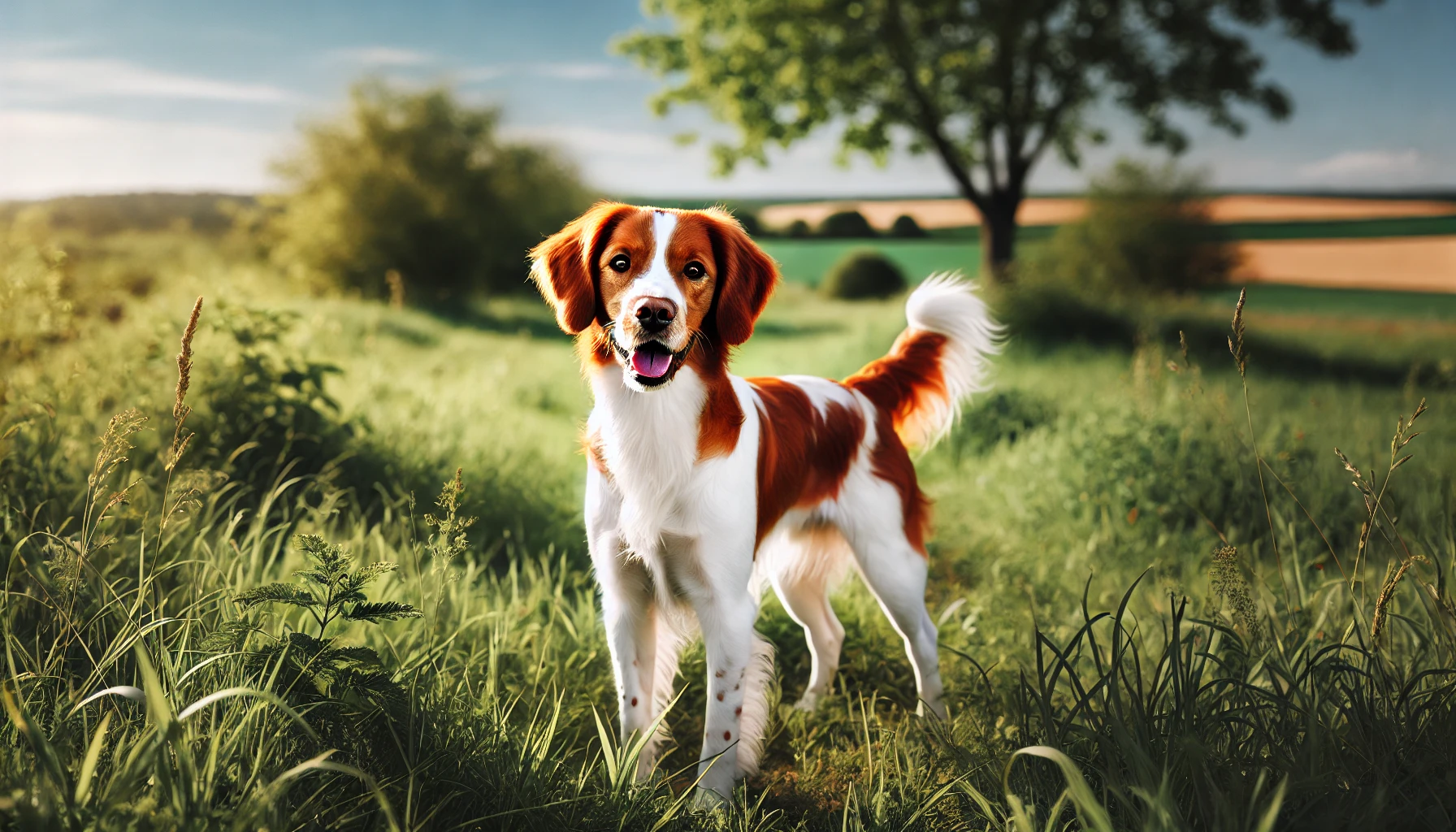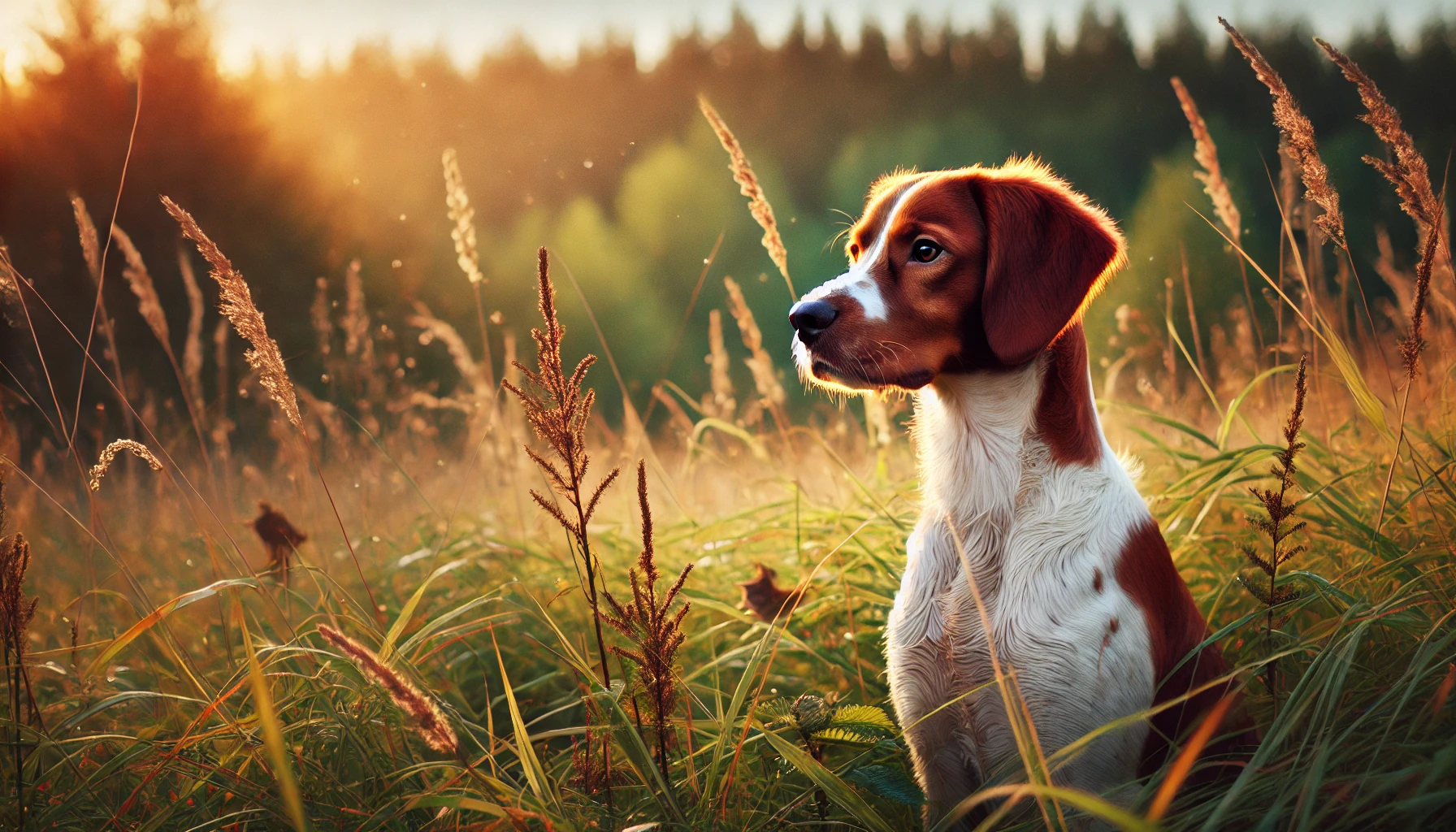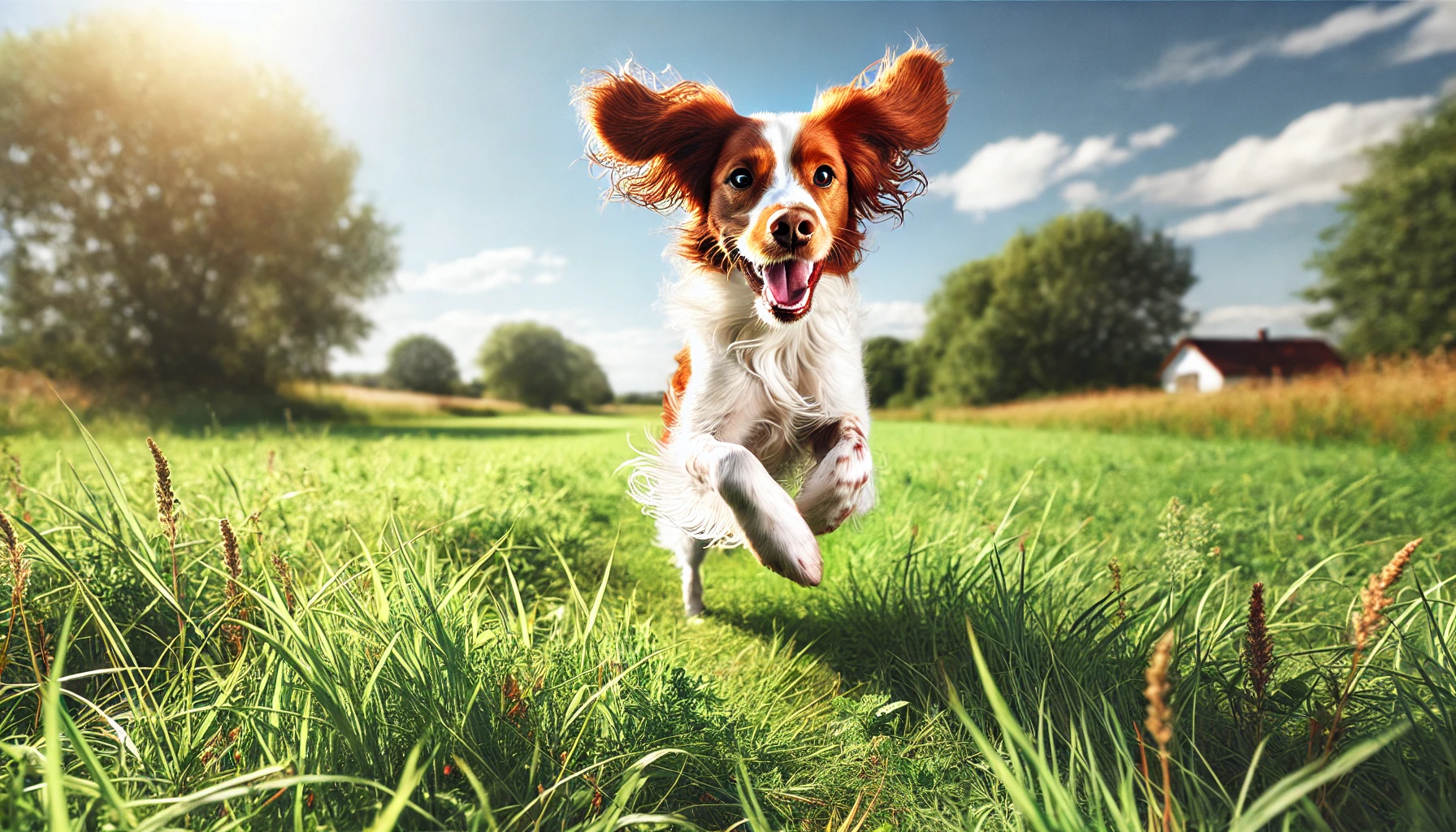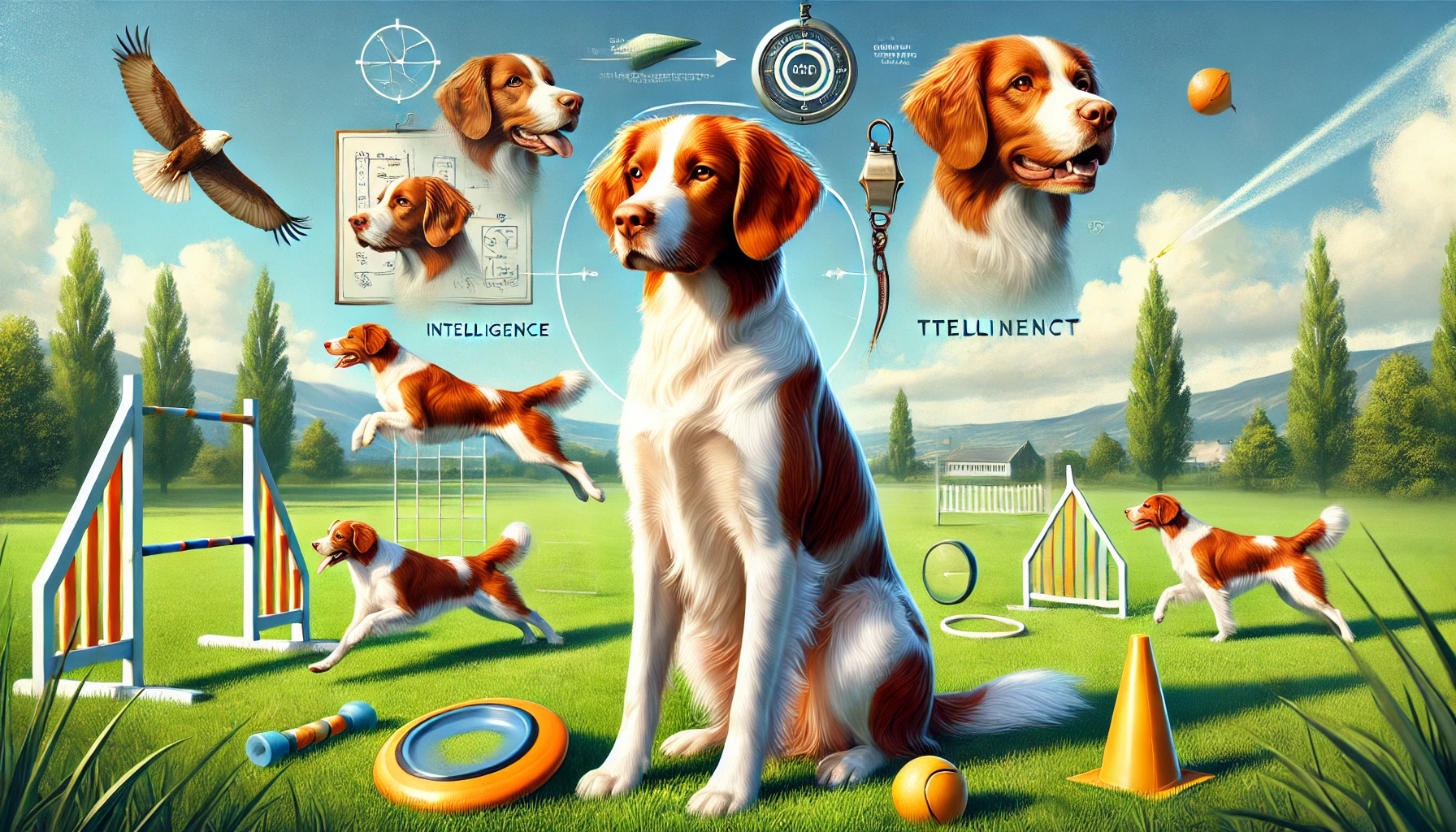Introduction to the Brittany Dog
The Origin of the Brittany Breed
The Brittany dog, also known simply as the Brittany, is a breed with a rich history rooted in the Brittany region of France. Named after its place of origin, the Brittany was originally bred as a versatile hunting dog, adept at both pointing and retrieving. This breed’s ancestry can be traced back to the 17th century, with its ancestors likely including spaniels and setters, contributing to its unique characteristics and abilities.
Characteristics and Appearance
Brittany dogs are known for their medium size, standing about 17.5 to 20.5 inches tall at the shoulder and weighing between 30 to 40 pounds. Their compact, athletic build makes them agile and quick, perfect for their original purpose as hunting dogs. Their coats are typically dense and wavy, coming in various colors, including orange and white, liver and white, and tricolor. Their expressive eyes and alert, eager-to-please expression endear to dog lovers.
Popularity and Recognition
Brittany Dog’s popularity extends beyond France, as it has become a beloved breed in many parts of the world, particularly in the United States. The breed was first recognized by the American Kennel Club (AKC) in 1934 and has since gained a strong following among hunters and pet owners alike. Brittany Dog’s intelligence, energy, and affectionate nature make it an excellent companion for active families and individuals.
In summary, the Brittany dog is a breed with a storied past, known for its hunting prowess, striking appearance, and friendly demeanor. Whether you’re interested in their historical roots, physical traits, or growing popularity, the Brittany dog offers a fascinating introduction to a versatile and beloved breed.

Fact #1: Brittany Dog are Natural Hunters
Hunting Instincts
The Brittany dog is renowned for its exceptional hunting instincts, making it popular among hunters and outdoor enthusiasts. Bred primarily as a bird dog, the Brittany’s keen sense of smell, agility, and quick reflexes allow it to excel in the field. This breed’s natural hunting instincts are deeply ingrained, enabling them to track and point game birds precisely. Brittanys are often described as having a “soft mouth,” meaning they can retrieve games without causing damage, a highly valued trait in hunting dogs.
Training for Hunting
Training a Brittany for hunting can be a rewarding experience, as they are quick learners and eager to please. Basic obedience training is the first step, ensuring that the dog responds to commands such as “sit,” “stay,” and “come.” Once these fundamentals are in place, more specialized training can begin. This includes teaching the dog to work on a leash, to point and hold game birds, and to retrieve both on land and in water.
Positive reinforcement methods work best with Brittanys, as they respond well to praise and rewards. Consistency and patience are key, as is starting training at a young age. Socializing your Brittany with other dogs and exposing them to various environments will also help them become well-rounded hunting companions.
Best Practices for Hunting with Brittanys
When taking your Brittany out for a hunt, there are several best practices to ensure a successful and enjoyable experience for both you and your dog:
- Prepare for the Environment: Ensure your Brittany Dog is accustomed to the terrain and climate where you will be hunting. This includes acclimating them to water if you plan on waterfowl hunting.
- Health and Safety: Regular veterinary check-ups are essential to keep your Brittany dog in peak condition. Make sure your dog is up-to-date on vaccinations and protected against parasites. Carry a first-aid kit tailored for dogs during hunting trips.
- Hydration and Nutrition: Bring plenty of water and snacks to keep your Brittany hydrated and energized throughout the hunt. Hunting can be physically demanding, and maintaining your dog’s stamina is crucial.
- Equipment: Invest in quality hunting gear, such as a well-fitted hunting vest for your Brittany, which can provide visibility and protection. A GPS collar can also be useful in tracking your dog if they wander too far.
- Post-Hunt Care: After the hunt, check your Brittany for any injuries, burrs, or ticks. Provide a comfortable resting place and plenty of water to help them recover from the exertion.
Fact #2: Brittany Dog are Highly Energetic
Daily Exercise Needs
Brittanys are known for their high energy levels, requiring ample exercise to stay happy and healthy. As an active breed originally bred for hunting, they need more physical activity than the average dog. Brittany should receive at least an hour of vigorous exercise each day. This can include long walks, runs, or play sessions in a secure, open area where they can roam freely. Regular exercise helps prevent boredom, which can lead to destructive behaviors.

Best Activities for Brittany Dog
Given their boundless energy and intelligence, Brittanys excel in various activities that challenge their bodies and minds. Some of the best activities for Brittanys include:
- Fetch: A classic game of fetch is perfect for Brittanys, allowing them to run and retrieve, satisfying their instincts.
- Agility Training: Brittanys are agile and quick learners, making them great candidates for agility training. This activity provides both physical exercise and mental stimulation.
- Hiking: Taking your Brittany on hikes can be a fantastic way to burn off energy while exploring new environments. Ensure your dog is in good shape, and bring plenty of water.
- Swimming: Many Brittanys enjoy swimming, which is an excellent low-impact exercise. It’s also a great way to cool off on hot days.
- Interactive Toys: Toys that require problem-solving skills can keep Brittany’s dog engaged and mentally stimulated, such as puzzle feeders or treat-dispensing toys.
Managing Their Energy Indoors
When the weather doesn’t cooperate, or if outdoor exercise isn’t an option, there are still ways to manage your Brittany’s energy indoors:
- Interactive Play: Engage your Brittany with games like hide-and-seek or tug-of-war to burn off some energy.
- Training Sessions: Short, frequent training sessions can be a great way to tire out Brittany’s dog mentally. Teaching new tricks or commands keeps their mind active.
- Indoor Agility: Set up a mini agility course in your living room using household items like chairs, broomsticks, and blankets to create obstacles.
- Treadmill: Some Brittanys can be trained to use a treadmill for additional exercise, but it’s important to introduce this gradually and ensure their safety.
- Nose Work: Activities that involve using their sense of smell, like scent games or hide-and-seek with treats, can be very engaging for Brittanys.
Fact #3: Brittany Dog is Extremely Intelligent
Training Tips and TricksBrittanys are known for their high intelligence, which makes them highly trainable and responsive to learning new commands and tricks. Here are some effective training tips for Brittanys:
- Start Early: Begin training your Brittany puppy as soon as possible. Early socialization and basic obedience training are crucial for developing good behavior.
- Consistency: Use consistent commands
and routines to avoid confusion. Consistency helps Brittanys understand their expectations. - Positive Reinforcement: Brittany’s dog responds well to positive reinforcement techniques such as treats, praise, and play. Reward good behavior immediately to reinforce the connection between the action and the reward.
- Short Sessions: Keep training sessions short and engaging. Brittanys have a lot of energy and can become bored with long, repetitive training sessions. Aim for multiple short sessions throughout the day.
- Variety: Incorporate a variety of commands and activities to keep training interesting. Brittanys enjoy learning new things, so challenge them with different tasks and tricks.

Mental Stimulation Activities
Given their intelligence, Brittanys thrive on mental stimulation. Here are some activities to keep their minds sharp and engaged:
- Puzzle Toys: Provide puzzle toys that require your Brittany to think and solve problems to get treats or toys out. This keeps them entertained and mentally stimulated.
- Scent Work: Brittanys have an excellent sense of smell. Engage them in scent work activities where they can find hidden treats or objects using their nose.
- Interactive Games: Games like hide-and-seek, where you hide and call your dog to find you, can be physically and mentally stimulating for a Brittany.
- Advanced Training: Teach your Brittany more complex commands and tricks, such as rolling over, playing dead, or fetching specific items. This challenges their intelligence and keeps them engaged.
- Agility Courses: Setting up an agility course in your backyard or participating in organized agility training can provide both physical exercise and mental stimulation.
Problem-Solving Abilities
Brittanys are natural problem solvers. Their intelligence allows them to figure out challenges and tasks quickly. Here are some ways to harness and develop their problem-solving abilities:
- Interactive Feeding: Use interactive feeders that require your Brittany to solve a puzzle to get their food. This not only feeds them but also engages their mind.
- Teaching Tricks: Teach your Brittany to solve practical problems, such as opening doors, turning off lights, or retrieving specific items on command.
- Exploration: Allow your Brittany to explore new environments and solve problems they encounter. This could be as simple as navigating a new obstacle course or finding their way through a maze.
- Hide and Seek with Toys: Hide your Brittany’s favorite toys around the house or yard and encourage them to find them. This stimulates their natural hunting instincts and sharpens their problem-solving skills.
- DIY Challenges: Create DIY challenges at home using everyday items. For example, hide treats under cups and encourage your Brittany to figure out how to get them.
Fact #4: Brittany Dog Thrives on Companionship
Socialization Needs
Brittanys are social animals that crave companionship and interaction with humans and other dogs. Proper socialization is essential to ensure they grow into well-adjusted and confident pets. Here are some key points about their socialization needs:
- Early Socialization: Introduce your Brittany puppy to various people, animals, and environments from a young age. This helps them become comfortable and friendly in different situations.
- Positive Experiences: Ensure that all socialization experiences are positive. Treats, praise, and play create enjoyable interactions with new people and animals.
- Regular Interaction: Brittanys should have regular opportunities to interact with other dogs. Playdates, dog parks, and obedience classes are great ways to provide social interaction.
- Exposure to Different Environments: Take your Brittany to different places, such as parks, busy streets, and pet-friendly stores. This exposure helps them adapt to various environments and reduces anxiety.
Best Companions for Brittanys
Brittanys are affectionate and form strong bonds with their families. They can get along well with a variety of companions if properly introduced and socialized:
- Human Family Members: Brittanys thrive on the companionship of their human family members. They are loyal and loving, enjoying quality time with their owners.
- Other Dogs: With proper socialization, Brittanys can get along well with other dogs. They enjoy playing and interacting with canine companions, making them great additions to multi-dog households.
- Children: Brittanys are generally good with children, especially when raised together. They are patient and gentle, but supervision is always recommended to ensure safe interactions.
- Other Pets: Brittanys can coexist with other pets, such as cats if introduced properly and at a young age. Their hunting instincts might make interactions with smaller pets more challenging, so careful supervision is necessary.
Handling Separation Anxiety
Brittanys are known for their strong attachment to their owners, which can sometimes lead to separation anxiety. Here are some strategies to manage and prevent separation anxiety in Brittanys:
- Gradual Departures: Start by leaving your Brittany alone for short periods and gradually increase the duration. This helps them get used to being alone without feeling abandoned.
- Create a Safe Space: Provide a comfortable and secure area where your Brittany can relax when you’re not home. This could be a crate or a designated room with their favorite toys and bedding.
- Routine: Establish a consistent daily routine to help your Brittany know what to expect. Predictable routines can reduce anxiety and provide a sense of security.
- Exercise Before Leaving: Give your Brittany plenty of exercise before you leave. A tired dog is less likely to experience anxiety and engage in destructive behavior.
- Interactive Toys: Provide interactive toys or puzzles that keep your Brittany occupied while you’re away. These toys can help distract them and reduce feelings of loneliness.
- Stay Calm: When leaving or returning home, stay calm and avoid making a big fuss. This helps your Brittany understand that your comings and goings are normal and not a cause for concern.

Fact #5: Brittany Dog are Versatile and Adaptable
Living Conditions
Brittanys are incredibly versatile dogs that adapt to various living conditions, making them suitable for various households. Whether you live in a city apartment or a rural farmhouse, Brittany can thrive with the right care and attention. Here are some considerations for their living conditions:
Apartment Living: While Brittanys have high energy levels, they can adapt to apartment living as long as they receive sufficient exercise. Regular walks, visits to dog parks, and indoor play sessions are essential to keep them happy and healthy.
Suburban Homes: Brittanys are well-suited for suburban homes with fenced yards where they can safely run and play. A secure yard allows them to burn off energy and engage in outdoor activities.
Rural Settings: Brittanys can flourish in rural settings with ample space to explore and roam. Their hunting instincts and love for the outdoors make them ideal companions for country living.
Adapting to Different Climates
Brittany Dog are adaptable to various climates, although certain precautions should be taken to ensure their comfort and well-being in extreme weather conditions:
Cold Weather: Brittanys have a dense coat that provides some protection against cold weather. However, additional measures such as dog sweaters or jackets may be necessary in extremely cold climates. Limit outdoor time during severe cold and provide a warm, cozy indoor space.
Hot Weather: In hot climates, it’s crucial to prevent overheating. Ensure your Brittany has access to plenty of fresh water and shade. Avoid strenuous exercise during the hottest parts of the day and opt for early morning or late evening walks.
Moderate Climates: Brittanys are most comfortable in moderate climates where they can enjoy outdoor activities without extreme temperatures. Regular grooming helps keep their coat in good condition, regardless of the climate.
Integrating with Other Pets
Brittanys are generally friendly and can integrate well with other pets if properly introduced and socialized. Here are some tips for successful integration:
- Introducing New Pets: When introducing a new pet, do so gradually and in a controlled environment. Allow Brittany and the new pet to sniff and get to know each other under supervision.
- Positive Reinforcement: Use positive reinforcement techniques, such as treats and praise, to reward calm and friendly behavior between your Brittany and other pets.
- Supervision: Always supervise initial interactions between your Brittany and other pets, especially smaller animals that might trigger their hunting instincts.
- Separate Spaces: Provide separate spaces for each pet, especially during the initial introduction phase. This allows each animal to have a safe and secure area to retreat if needed.
- Consistent Routine: Maintain a consistent routine to help all pets adjust to each other’s presence. Consistency in feeding, playtime, and exercise helps reduce stress and promotes harmony.
Final Take for Brittany Dog
Brittanys are wonderful pets with many great qualities. They are smart, energetic, and love being with their families. These dogs need plenty of exercise and attention to stay happy. Regular grooming and check-ups help them stay healthy. They can live long, healthy lives with good care. Brittanys get along well with other pets and children. They are easy to train and enjoy learning new things. Overall, Brittanys have made loving and loyal companions for many years.
Frequently Asked Questions (FAQ) about Brittany Dogs
Q1: What is the average lifespan of a Brittany dog?
Brittany dogs typically live between 12 to 14 years, but with proper care, some can live even longer. Regular veterinary check-ups, a balanced diet, and ample exercise contribute to their longevity.
Q2: Are Brittany dogs good with children?
Yes, Brittany dogs are known for being friendly and gentle with children. They are playful and energetic, making them great companions for active families. However, always supervise interactions between dogs and young children to ensure safety.
Q3: How much exercise does a Brittany dog need?
Brittany dogs are very active and need at least an hour of vigorous daily exercise. This can include walks, runs, playtime, and activities like fetch or agility training. Regular exercise helps keep them healthy and prevents boredom.
Q4: Do Brittany dogs shed a lot?
Brittany dogs have a moderate shedding level. Regular brushing, at least once a week, helps control shedding and keeps their coat healthy. During shedding seasons, you may need to brush them more frequently.
Q5: Are Brittany dogs easy to train?
Yes, Brittany dogs are highly intelligent and eager to please, making them relatively easy to train. They respond well to positive reinforcement methods such as treats, praise, and play. Consistent and patient training from a young age yields the best results.
Q6: What are common health issues in Brittany dogs?
Common health issues in Brittany dogs include hip dysplasia, epilepsy, hypothyroidism, and ear infections. Regular veterinary care, a healthy diet, and proper grooming can help prevent and manage these conditions.
Q7: Can Brittany’s dogs live in apartments?
Brittany dogs can live in apartments with enough exercise and mental stimulation. Daily walks, playtime, and visits to dog parks are essential to keep them happy and healthy in smaller living spaces.
Q8: Do Brittany dogs get along with other pets?
Brittany dogs can get along well with other pets if properly socialized from a young age. Introduce them gradually and supervise their interactions to ensure they get along well with other dogs and animals.
Q9: How often should I groom my Brittany dog?
Brittany dogs require regular grooming, including weekly brushing, to prevent matting and remove loose hair. Bathing should be done every 4 to 6 weeks or as needed. Regular ear cleaning, nail trimming, and dental care are important in their grooming routine.
Q10: What kind of diet is best for a Brittany dog?
A balanced diet with high-quality dog food is best for Brittany dogs. Consult your veterinarian for specific dietary recommendations based on your dog’s age, weight, and health needs. Including omega-3 and omega-6 fatty acids in their diet helps maintain a healthy coat.


